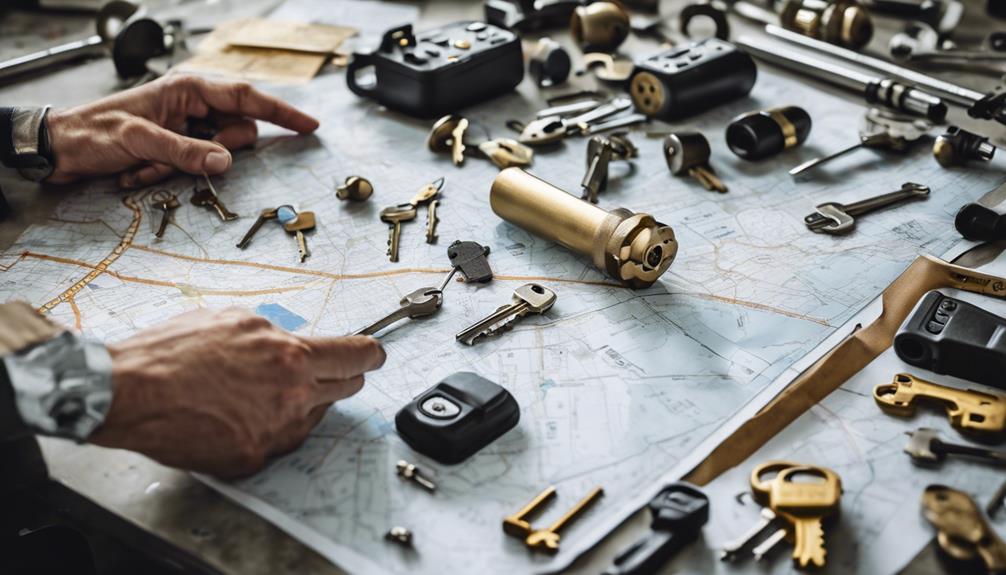Understanding lock replacement regulations in your area is essential for your property's safety. You need to know the specific laws that apply, especially if you're in a multi-family dwelling or a historic property. Often, local building codes dictate the types of locks you can install and the necessary permits. Don't forget to check for compliance with safety standards to avoid penalties, such as fines or higher insurance premiums. Staying informed through local newsletters or locksmiths can help you navigate these rules easily. Want to explore how to guarantee your locks meet all requirements?
Key Takeaways
- Check local laws to understand homeowner and business responsibilities regarding lock replacement and compliance with safety regulations.
- Different regulations apply to residential, commercial, and specialty locks, ensuring varied security needs are met.
- Obtain necessary permits before replacing locks, especially for commercial properties, to avoid potential fines.
- Adhere to building codes that dictate lock types, materials, and installation methods for optimal safety and security.
- Stay informed about evolving regulations by subscribing to local government newsletters for timely updates.
Local Lock Replacement Laws
When it comes to local lock replacement laws, homeowners need to understand their rights and responsibilities. Knowing the specific lock replacement rules in your area can empower you to make informed decisions when securing your home.
Many localities have regulations regarding the types of locks allowed, especially in multi-family dwellings or historic properties. It's vital for businesses to be aware of these regulations as well, as they directly impact commercial security measures.
For instance, essential lock replacement for businesses involves adhering to local laws to guarantee adequate protection against potential threats.
Understanding lock laws guarantees you're compliant and helps maintain neighborhood safety. Before replacing any locks, you should check your local codes. This can often be done through your city or county's website or by contacting a local authority.
Regulations might dictate the installation process, types of locks permissible, or even the need for permits in certain situations.
Types of Locks Governed
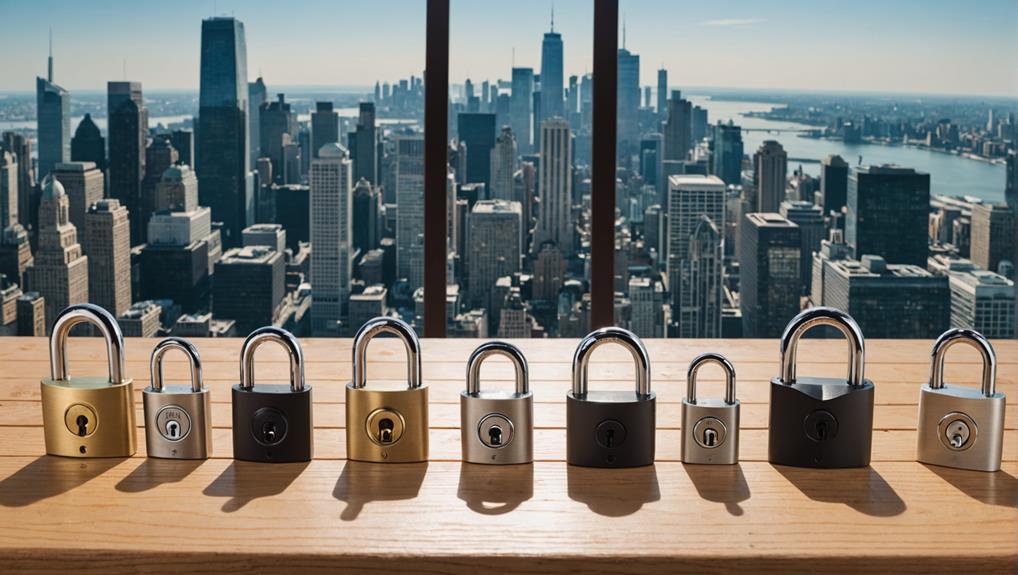
When it comes to lock replacement, understanding the various types of locks governed by regulations is essential.
Building codes can greatly influence these decisions, as they dictate the minimum safety and security standards that must be met.
You'll find that residential lock regulations focus on home safety, while commercial lock standards cater to business security.
Additionally, specialty lock requirements address unique situations, ensuring every space is adequately protected.
For instance, navigating lock replacement often involves adhering to specific code guidelines that vary by location and type of property.
Residential Lock Regulations
Numerous types of locks are governed by residential lock regulations, each designed to enhance security and safety in homes. When you're considering lock replacement, it's important to understand the specific regulations in your area.
These lock replacement regulations often dictate the types of locks you can use, ensuring they provide adequate protection against unauthorized entry.
Common residential lock types include deadbolts, knob locks, and smart locks, each with unique requirements. Lock installation standards are vital for ensuring that these locks function effectively. You'll want to make sure you're following these standards to avoid any compliance issues that could compromise your home's security.
Additionally, be aware that local codes may require certain features, such as keyless entry systems or anti-pick designs, to meet safety regulations.
By adhering to these lock compliance guidelines, you'll not only protect your loved ones but also contribute to the safety of your neighbors. It's a small step that can lead to a significant impact on community security.
Always consult local regulations before making changes, and prioritize locks that meet or exceed these standards for the best protection.
Commercial Lock Standards
Understanding residential lock regulations sets a foundation for recognizing the importance of commercial lock standards. In commercial settings, the types of locks you choose aren't just about security; they also need to comply with locksmith regulations and regional lock standards. These standards guarantee that the locks you install meet the necessary safety and operational requirements suited for various businesses.
You'll find that commercial locks often differ from residential ones with regard to complexity and durability. Common types include mortise locks, cylindrical locks, and electronic access systems, each designed to withstand higher usage and offer enhanced security features.
When selecting locks for your business, it's essential to take into account the specific needs of your facility. For instance, an office may require a different lock system compared to a warehouse.
Additionally, be mindful of any local regulations that might dictate specific lock types or features.
Specialty Lock Requirements
Specialty locks play an indispensable role in various settings, each governed by specific requirements to guarantee safety and functionality.
Whether you're serving a residential community, a commercial facility, or an industrial site, understanding the regulations for specialty locks is essential.
For instance, you might encounter electronic locks in healthcare environments, where access control is critical. These locks often need to comply with health regulations, making certain that sensitive areas are secure while allowing authorized personnel seamless access.
Similarly, high-security locks are indispensable in government buildings, where stringent standards protect national interests.
Additionally, you should consider the requirements for fire-rated locks in buildings to guarantee safety during emergencies. These locks must meet specific criteria to function effectively under high heat and smoke conditions.
Lastly, if you're managing a facility with vulnerable populations, like schools or assisted living centers, tamper-resistant locks may be mandated to enhance safety.
Permits and Approvals Required
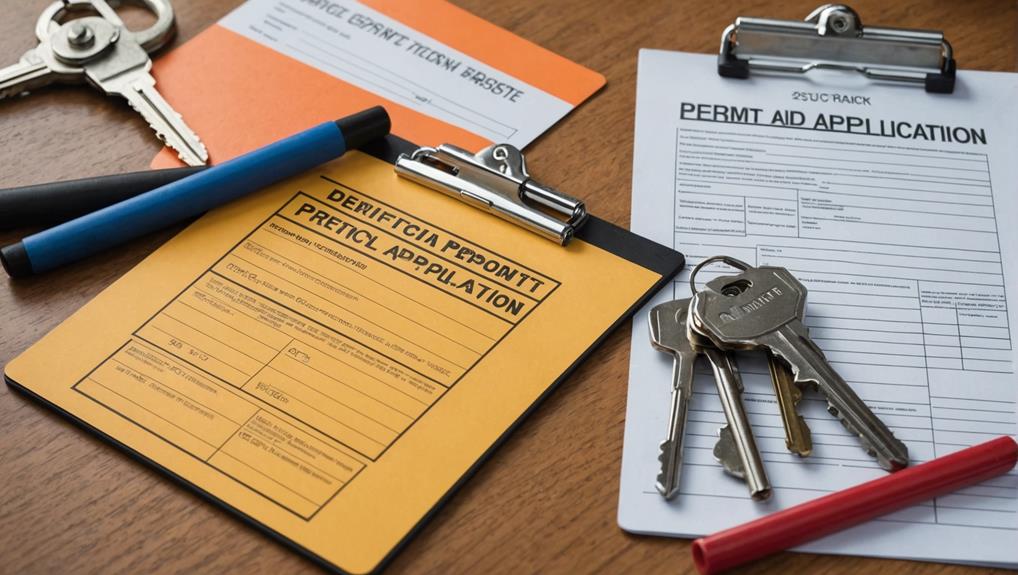
Before you start replacing your locks, you need to check your local permit requirements.
It's also important to be aware of your responsibilities as a landlord, particularly regarding landlord obligations for lock replacement.
Understanding the approval process can save you time and hassle.
Let's go over what you need to know to guarantee your project is compliant.
Local Permit Requirements
When replacing locks, it's important to check local permit requirements to verify compliance with regulations. Many areas require permits for lock replacement, especially if you're dealing with commercial properties or historical buildings. This is vital not only for legality but also to guarantee safety and security for everyone involved.
Start by contacting your local building department or municipality. They can provide specific information on whether you need a permit for your lock replacement project. You might find that some regions have straightforward guidelines, while others might've more complex requirements.
Don't overlook the potential need for inspections, especially if the locks are part of a larger security system. Keeping your community safe is a priority, and adhering to local guidelines helps achieve that goal.
Additionally, if you're working with a contractor, they should be familiar with these requirements and can assist you in obtaining the necessary permits. By taking these steps, you'll not only verify compliance with the law but also reinforce your commitment to serving your community's safety needs.
Approval Process Overview
Steering through the approval process for lock replacement can seem intimidating, but it doesn't have to be. By understanding the necessary permits and approvals, you can guarantee a smooth experience.
First, check with your local building department or regulatory authority to identify the specific permits required for your project. In many areas, a simple replacement mightn't need extensive permits, but it's always best to verify.
Next, gather the necessary documentation, which may include proof of ownership, plans for the lock replacement, and any previous inspection reports. You'll likely need to fill out a permit application, detailing the specifics of your project.
Don't hesitate to ask questions; local officials are often enthusiastic to help and guide you through the process.
Once submitted, your application will undergo review. This step could take a few days to a couple of weeks, depending on your location. Be patient and ready to provide additional information if requested.
After approval, you can proceed with the replacement, guaranteeing you're in compliance with local regulations.
Compliance With Safety Standards
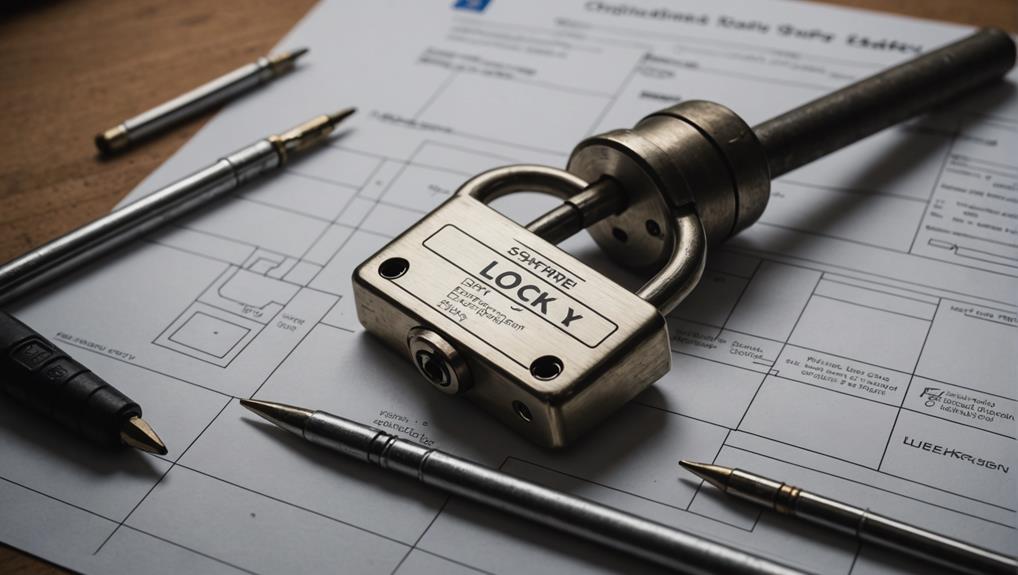
Guaranteeing compliance with safety standards is vital for effective lock replacement, as it not only protects property but also enhances overall security. When you're planning to replace locks, it's important to choose products that meet established safety regulations.
In addition to local guidelines, be aware that fire safety regulations can greatly influence your lock selection, particularly in multi-family dwellings and commercial properties. Navigating fire safety rules helps guarantee that the locks you choose not only provide security but also comply with necessary safety measures. Not only does this safeguard your space, but it also builds trust within your community.
You should familiarize yourself with the relevant safety standards in your area, which may include guidelines from organizations like the American National Standards Institute (ANSI) and Underwriters Laboratories (UL). These standards often specify requirements for durability, resistance to forced entry, and fire safety.
By opting for locks that comply with these safety standards, you're not only guaranteeing a higher level of protection but also contributing to a culture of safety and responsibility.
Additionally, don't hesitate to consult with licensed professionals who understand these regulations. They can provide valuable insights and help you select the best locks for your specific needs.
Impact of Building Codes
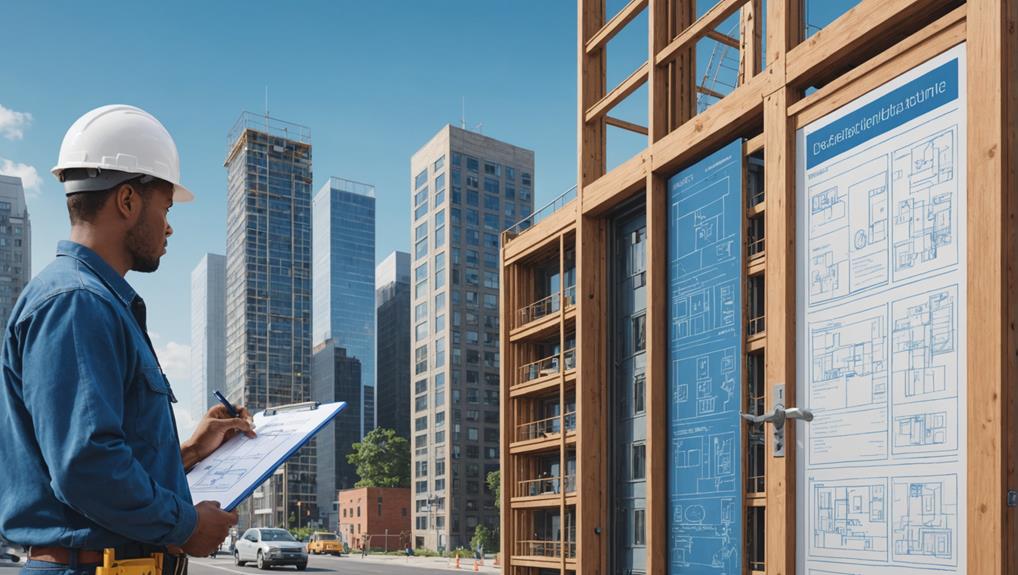
Building codes play a significant role in determining the types of locks you can use, especially in residential and commercial properties. These regulations guarantee that the locks you choose meet safety standards, providing security for you and those you serve.
Understanding these codes is essential, as they often dictate specific requirements for lock types, materials, and installation methods. For instance, certain locations might require locks that are resistant to tampering, which is crucial for enhanced security. It's also important to be aware of the understanding lock replacement costs, as these can vary based on compliance with local regulations.
When you're replacing or installing locks, you need to take into account local building codes that may mandate certain features, like deadbolts or fire-rated locks. This isn't just about compliance; it's about enhancing the safety of the environments you care for. By adhering to these codes, you can guarantee that your choices contribute to the overall safety and security of your property.
Additionally, building codes often evolve, so staying updated is important. Regularly reviewing your local regulations can help you make informed decisions that align with safety standards.
Ultimately, when you prioritize compliance with building codes, you're not just meeting legal requirements—you're also fostering a secure atmosphere for everyone who enters your space. Taking these steps showcases your commitment to serving others effectively and responsibly.
Penalties for Non-Compliance
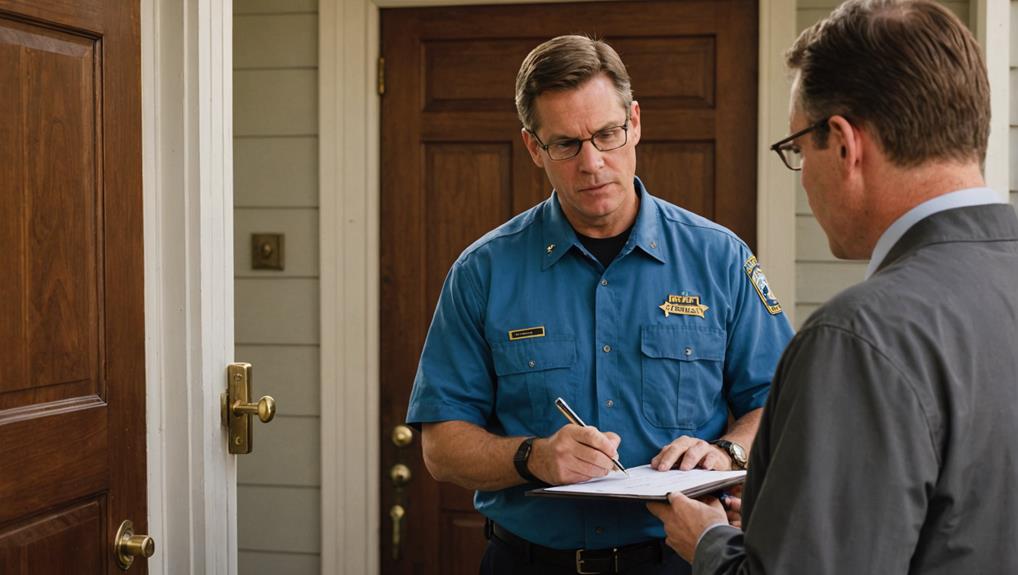
Failing to comply with lock replacement regulations can lead to serious penalties that affect both your finances and your reputation. When you don't adhere to these guidelines, you risk more than just a warning.
Understanding the various factors that influence lock costs can help you make informed decisions regarding compliance. Here are some potential consequences you might face:
- Fines and Fees: Local authorities often impose monetary penalties for non-compliance, which can accumulate quickly, impacting your budget.
- Legal Action: In severe cases, non-compliance can lead to lawsuits or legal actions against you, which not only cost you money but also time and peace of mind.
- Increased Insurance Premiums: If your property is deemed non-compliant, insurance companies may raise your premiums, making it costlier to protect your investment.
These penalties can hinder your ability to serve others effectively, whether you run a business or manage a community space.
Ensuring compliance with lock replacement regulations not only safeguards your financial health but also enhances your reputation as someone who values safety and responsibility.
Tips for Staying Informed

Staying updated on lock replacement regulations can feel overwhelming, but there are practical ways to keep track of the latest changes. First, consider subscribing to local government newsletters or websites. Many municipalities post updates on regulations, ensuring you receive the information directly in your inbox.
It's also important to understand the legal implications of re-keying locks, as these can vary by location and may affect both landlords and tenants. For more information, check out the legal aspects of re-keying rental locks.
Next, connect with local organizations and community groups focused on safety and security. These groups often host meetings or workshops that can provide valuable insights into regulations and best practices. Engaging with fellow community members allows you to share knowledge and experiences.
Don't overlook social media. Follow relevant local agencies or groups that discuss lock replacement issues. Their posts can alert you to changes and provide helpful resources.
Lastly, consider establishing relationships with local locksmiths or security professionals. They stay informed about the latest regulations and can be an excellent resource for you and others in your community.
Frequently Asked Questions
Can I Replace Locks Myself Without Professional Help?
Yes, you can replace locks yourself without professional help!
It's a manageable DIY project, especially if you have some basic tools and follow instructions. Just make sure to choose the right lock for your door type and size.
Take your time during the process, and double-check your work for safety. If you encounter any issues or feel unsure, don't hesitate to ask a friend for assistance.
You've got this!
How Often Should I Replace My Locks?
You should consider replacing your locks every few years or whenever you move into a new home.
Regularly inspecting them for wear and tear is essential too.
If you've experienced a break-in or lost a key, it's time for an immediate change.
Keeping your locks updated not only enhances security but also gives you peace of mind.
Are There Specific Brands Recommended for Compliance?
When it comes to lock brands, you'll want the best of the best, like choosing a knight's armor for battle.
Brands like Schlage, Kwikset, and Yale are often recommended for their durability and security.
They've got the reputation to back them up, ensuring you protect not just your home, but also the peace of mind of those you serve.
Trust these names, and you'll keep everyone safe and sound!
What Should I Do if My Lock Is Damaged?
If your lock's damaged, you'll want to act quickly.
First, assess the damage to determine if it's repairable or needs replacing. If it's beyond repair, choose a new lock that meets your security needs.
Don't forget to check if it complies with any local regulations.
Once you've got your new lock, install it yourself or hire a professional to guarantee it's done correctly.
Keeping your space secure is always a priority!
Do Apartment Renters Have Lock Replacement Rights?
As an apartment renter, you often have rights regarding lock replacement, but it can vary by lease agreements and local laws.
Typically, if your lock is damaged or insecure, notifying your landlord is the first step. They might be responsible for repairs or replacements.
Be certain to check your lease and communicate openly with your landlord to guarantee your safety and security.
It's crucial to know your rights and advocate for yourself.
Conclusion
Maneuvering lock replacement regulations can feel overwhelming, but staying informed keeps your property secure and compliant. Imagine the frustration of facing penalties or safety issues simply because you overlooked a detail. Don't let that happen to you. By understanding local laws, types of locks, and necessary permits, you can guarantee peace of mind. So, take a moment to check your local regulations—your safety and security depend on it. You might just save yourself from a costly mistake.

